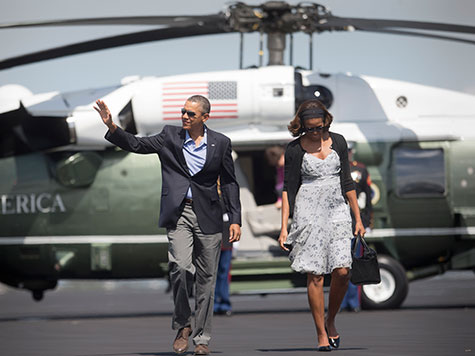An increase in funding for the Pentagon’s “Section 1206” counterterrorism programs, aimed at training and equipping foreign militaries to fight terrorism, suggests a shift in the Obama administration’s strategy, The Hill reports.
This shift could mean a decreased reliance on drone strikes against al-Qaida targets and U.S. Special Forces raids like the one that killed Osama bin Laden. The drone program has garnered significant criticism from foreign governments as well as from people on the left and the right at home.
The Hill examined the Pentagon’s “Section 1206” budget request for 2012 and found it increased more than $71 million in 2014, to $290 million.
White House officials deny they are relying more on foreign militaries than in the past, but President Obama’s own comments may suggest otherwise.
“Beyond Afghanistan, we must define our effort not as a boundless ‘global war on terror’ but rather as a series of persistent, targeted efforts to dismantle specific networks of violent extremists that threaten America,” Obama said. “In many cases, this will involve partnerships with other countries. Much of our best counter-terrorism cooperation results in the gathering and sharing of intelligence and the arrest and prosecution of terrorists.”
But critics note that many of the partner countries have been largely ineffective in combating al-Qaida despite the funding they have received from the U.S.
A March 2013 General Accountability Office (GAO) study, for example, found that “State and DOD have little objective evidence to show that the [Section 1206 funded] programs have been effective” in improving Lebanon’s ability to fight terrorism.
“In Yemen, our partner has been overall ineffective in really going after Al Qaeda there,” Katherine Zimmerman, a senior analyst at the American Enterprise Institute, told The Hill. “Honestly I think that we don’t need to implement a boots-on-the-ground strategy but we need to be very clear about what our partners are able to do and what they are not able to do.”
Money given to Iraq has been similarly ineffective in preventing western Iraq from becoming a safe haven for jihadists.
U.S. Sen. Lindsey Graham, (R-SC), told The Hill that support for foreign governments was not a “substitute for American counterterrorism expertise.”
Supporters, however, suggest that helping other countries to fight terrorism is a better solution for a country as war weary as the U.S. than the prior strategy of regime change.
“It’s increasingly about coaching, training and mentoring other nations’ forces, and assisting them with intelligence, airlift and logistics,” said Daniel R. Green, an al-Qaida expert and defense fellow at the Washington Institute for Near East Policy.

COMMENTS
Please let us know if you're having issues with commenting.